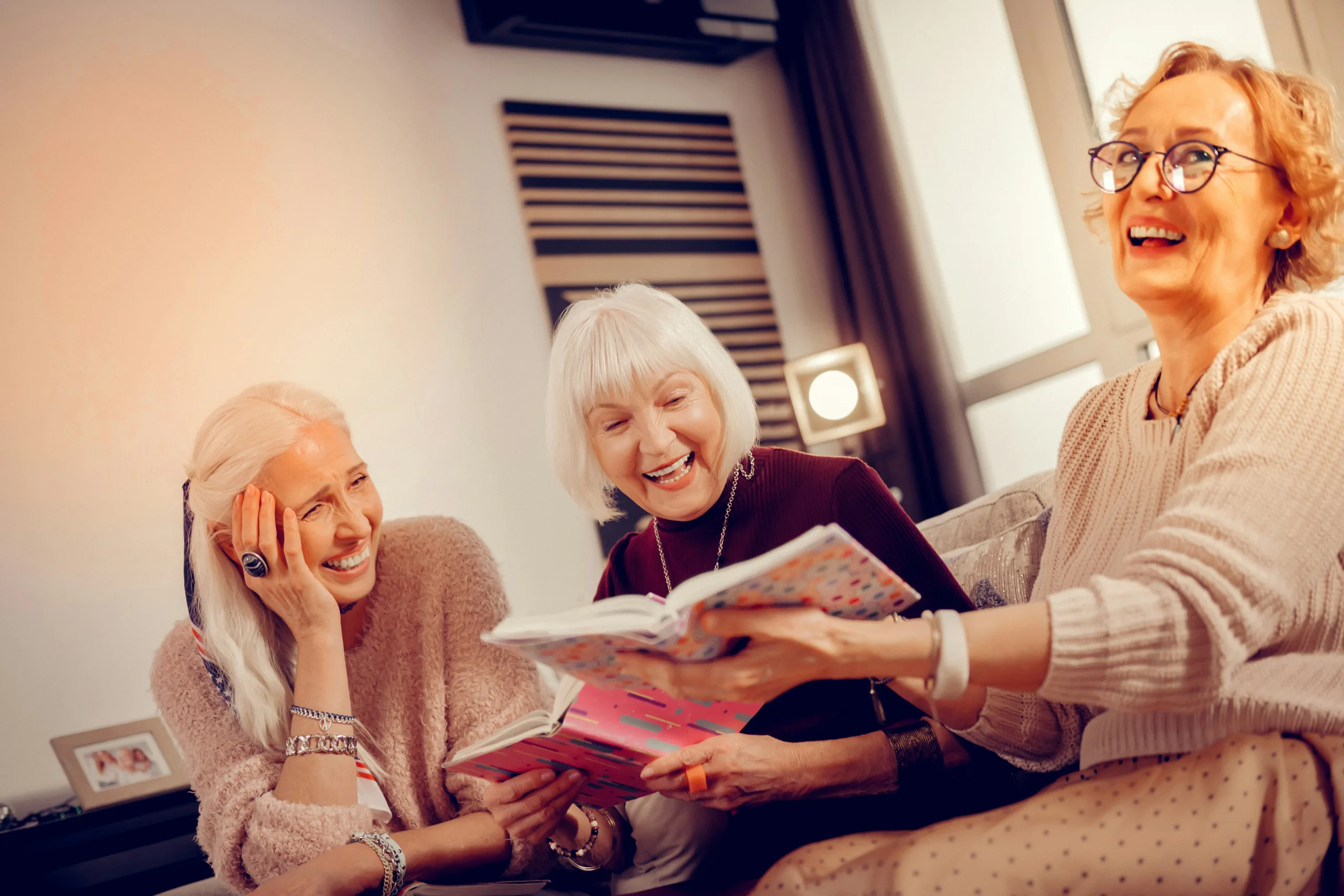How to Stay Mentally Strong in Your Golden Years
Aging is a beautiful journey, often filled with memories, milestones, and lessons that shape who we are. Yet, as the years pass, it’s easy to overlook how vital mental health is to living a fulfilling life in our golden years. Just as we care for our physical health, nurturing our emotional and psychological well-being is… Read more

Reviewed by The PsychPlus Team
December 4, 2024

Aging is a beautiful journey, often filled with memories, milestones, and lessons that shape who we are. Yet, as the years pass, it’s easy to overlook how vital mental health is to living a fulfilling life in our golden years. Just as we care for our physical health, nurturing our emotional and psychological well-being is equally important. Mental health is not just about avoiding illness; it’s about embracing joy, staying connected, and finding purpose. For seniors, maintaining mental wellness can enhance the quality of life, improve physical health, and strengthen relationships. It’s about savoring every moment and having the resilience to face life’s challenges.
There’s a persistent myth that feeling down, anxious, or forgetful is just “part of getting older.” This misconception prevents many seniors from seeking the support they deserve. Aging doesn’t mean you’re destined to feel isolated or lose interest in the things you once loved. Mental health challenges are not inevitable, they’re treatable, and no one should suffer in silence. It’s never too late to work on mental health. With the right tools and support, seniors can thrive mentally, emotionally, and socially.
Mental well-being isn’t a one-size-fits-all solution; it’s a personal journey. Seniors can take small but impactful steps like staying physically active, connecting with loved ones, exploring hobbies, and practicing mindfulness. Engaging in meaningful conversations and seeking professional support when needed can also make a world of difference. These years are an opportunity to prioritize self-care, lean into supportive communities, and embrace the joy of living fully and authentically.
Understanding Mental Health Challenges in Seniors
Common Issues: Depression, Anxiety, Loneliness, and Cognitive Decline
Mental health challenges like depression and anxiety often stem from significant life transitions in the senior years. Retirement, the loss of loved ones, or dealing with chronic illnesses can contribute to feelings of sadness, worry, or unease. These emotions can be overwhelming, especially when compounded by loneliness, which is all too common among seniors. Social isolation, a lack of regular interactions, or living far from family can intensify feelings of disconnection.
Cognitive decline, including memory loss and confusion, is another concern that can affect mental health. Conditions like dementia or Alzheimer’s not only impact the individual but also place a strain on their families. Recognizing these issues early is key to providing the necessary support.
Statistics Showing the Prevalence of Mental Health Conditions in Seniors
The numbers speak volumes about the importance of addressing mental health in seniors. Studies show that:
- 20% of adults aged 60+ experience mental or neurological disorders.
- Loneliness affects 43% of seniors, leading to a higher risk of depression.
- One in six seniors aged 60+ lives with cognitive impairment, with rates increasing as people age.
These figures remind us that mental health is just as critical as physical health, and proactive care can make all the difference.
Signs Family Members Should Watch For
Families are often the first line of support for seniors, so knowing what to look for is crucial. Be mindful of:
- Emotional changes: Persistent sadness, irritability, or excessive worry.
- Behavioral shifts: Withdrawing from activities, avoiding social engagements, or a lack of interest in hobbies.
- Cognitive struggles: Difficulty concentrating, confusion, or noticeable memory problems.
- Physical symptoms: Changes in appetite, disrupted sleep patterns, or unexplained fatigue.
Early recognition of these signs allows families to encourage seniors to seek help and find relief.
Taking Action
If you’re concerned about a senior in your life, don’t hesitate to explore support options. Mental health challenges in seniors are treatable, and resources like therapy, support groups, and medical care can provide relief and improve quality of life. For a deeper understanding of depression and its treatment, check out our blog, Depression 101: Understanding Symptoms, Seeking Help, and Finding Support.
At PsychPlus, we’re here to help seniors and their families navigate these challenges. Visit our Homepage to learn more about how we can support mental health at every stage of life.
Impact of Holidays, Parties, and Family Gatherings
Holidays and family gatherings can evoke a mix of emotions for seniors. While these events often bring joy and opportunities to reconnect with loved ones, they can also stir feelings of nostalgia or even isolation, especially for those who have experienced loss or live far from family. The hustle and bustle of holiday preparations and gatherings may feel overwhelming for seniors dealing with anxiety, making it difficult for them to fully enjoy these occasions.
Navigating Gatherings with Seniors in Mind
For seniors and their families, a little planning can go a long way in making these events more comfortable and enjoyable.
- Plan Together: Include seniors in the preparation process. Allowing them to help with decorations, menus, or simple tasks fosters a sense of involvement and belonging.
- Create Quiet Spaces: Large gatherings can be overstimulating, so having a designated quiet area where seniors can take a break helps them recharge.
- Encourage Meaningful Interactions: Help seniors connect on a deeper level by encouraging one, on, one conversations or small group activities that allow for genuine connection.

Easing Anxiety During Gatherings
Seniors experiencing anxiety during family events can benefit from simple techniques to relax. Gentle stretches are an effective way to reduce tension and feel more at ease. For practical and easy options, explore our blog, Feeling Anxious? Try These Easy, Everyday Stretches.
By taking these steps, families can help seniors enjoy the spirit of togetherness while creating a supportive and understanding environment.
Building a Supportive Network
The Role of Family and Friends in Combating Isolation
Family and friends play a pivotal role in reducing isolation for seniors. Regular visits, phone calls, and including seniors in day-to-day activities can provide them with a sense of connection and purpose. Simple gestures like listening to their stories, sharing a meal, or spending quality time together can make a profound difference in their mental well-being.
Benefits of Community Activities and Support Groups
Community involvement offers seniors opportunities to socialize, learn, and grow. Joining a local club, participating in group exercise classes, or attending workshops can help foster a sense of belonging. Support groups specifically designed for seniors create safe spaces to share experiences and challenges, reducing feelings of loneliness and providing mutual encouragement.
Professional Help: A Game-Changer for Mental Health
Seeking professional help is often the most effective way to address complex mental health challenges. Therapists, counselors, or psychiatrists can provide tailored strategies and interventions to improve emotional well-being. Professional support not only helps seniors manage their mental health but also empowers them to lead fulfilling, independent lives.
Easy Access to Expert Help
If you or a loved one is ready to take the next step, accessing professional care has never been simpler. Book an appointment with our experienced mental health professionals through our Book an Appointment page. We’re here to help seniors build a supportive network and thrive in their golden years.
Tips for Seniors to Prioritize Mental Wellness
Practical Self-Care Strategies
Maintaining mental wellness is achievable with consistent, simple practices:
- Stay Physically Active: Gentle exercises like walking, yoga, or swimming can boost mood and improve overall health.
- Maintain a Balanced Diet: Eating nutritious meals helps fuel the body and mind. Incorporating fruits, vegetables, and foods that are rich in omega 3 can have a positive impact on emotional well-being.
- Keep the Mind Active: Pursue hobbies like reading, gardening, or playing games. Learning a new skill or language stimulates the brain and builds confidence.
- Practice Mindfulness: Easy mindfulness exercises, like deep breathing or practicing gratitude, can reduce stress and bring a sense of calm. These techniques are especially beneficial for seniors who may find other methods overwhelming.
When to Seek Professional Help
Recognizing the Need for Medical Attention
Sometimes, mental health challenges go beyond what self-care can manage. It’s important to recognize when feelings of sadness, anxiety, or confusion persist or worsen. Symptoms like severe mood swings, withdrawal from loved ones, or difficulty performing daily activities may indicate the need for professional support.
Destigmatizing Therapy and Psychiatry for Seniors
Mental health care is just as important as physical care, but many seniors hesitate to seek help due to stigma. Normalizing therapy and psychiatry can make it easier for seniors to access the support they need without shame or fear. Seeking help is not a sign of weakness; it’s a proactive step toward a better quality of life.
Seamless Access with PsychPlus
At PsychPlus, we’re here to make the process as simple and accessible as possible. With our referral options, seniors can easily connect with mental health professionals dedicated to their well-being. Taking that first step has never been easier. Let us help you prioritize your mental health today!

Encouraging Conversations About Mental Health
Approaching Sensitive Topics
Talking about mental health with seniors can feel daunting, but it’s essential. Family members should approach these conversations with empathy and patience, choosing a calm and private setting. Start with open-ended questions like, “How have you been feeling lately?” or “Is there anything on your mind you’d like to share?” This shows genuine care and invites dialogue without judgment.
Making Seniors Feel Comfortable
Reassure seniors that discussing their feelings is a sign of strength, not weakness. Share examples of others who have benefited from opening up about mental health. Be a good listener; sometimes, offering your time and attention is the best support.
Additional Resources
For more guidance on supporting senior mental health, visit the PsychPlus Blog Page. You’ll find a wealth of resources and insights to help navigate this vital topic.
Conclusion
Mental health is just as important in our later years as it is at any other stage of life. Addressing these challenges can significantly improve seniors’ quality of life, enabling them to enjoy their golden years to the fullest. Families and seniors should take proactive steps, from open communication to seeking professional help when needed.
At PsychPlus, we make accessing care simple and supportive. Whether through tele-visits, in-office appointments, or navigating insurance, our team is here to help every step of the way. Take the first step toward mental wellness today, Book an Appointment with us and start the journey to better health.
Find a mental health care provider near you
Learn about the conditions we treat


